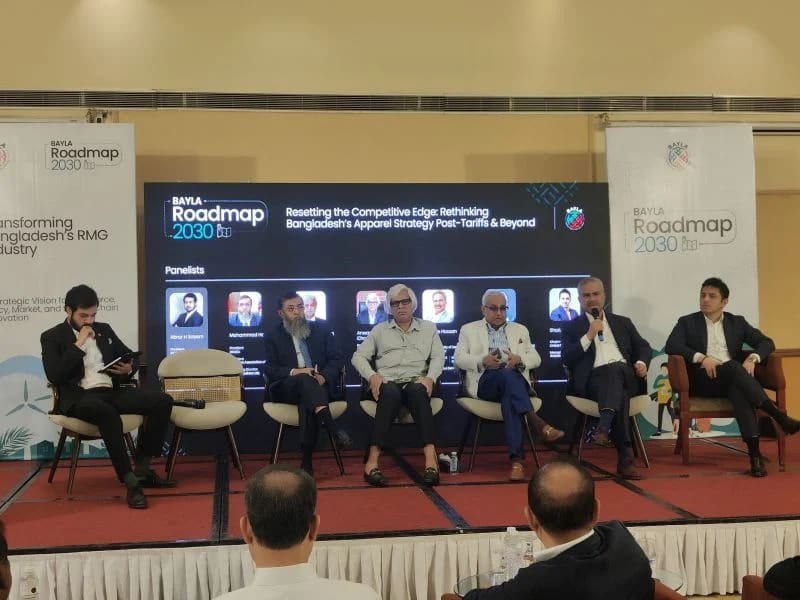DHAKA, 12 April 2025 – Leaders of Bangladesh’s apparel industry have appealed to the government for additional incentives on the import of cotton from the United States, aiming to reduce the bilateral trade gap and improve competitiveness in global markets.
Call to Action from Apparel Leaders
At a high-level discussion titled “BAYLA Roadmap 2030: Resetting the Competitive Edge, Rethinking Bangladesh’s Apparel Industry”, organised by the Bangladesh Apparel Youth Leaders Association (BAYLA) at a hotel in the capital, stakeholders laid out key policy demands to sustain and grow the country’s garment exports.
Chief among these was a request for a revised incentive scheme to counterbalance the higher price of US cotton—reported to cost around four cents more per pound compared to cotton sourced from other countries.
“If the government provides an equivalent cash incentive for US cotton imports, local entrepreneurs would be more inclined to import from the United States, thus reducing the trade imbalance,”
said Kutubuddin Ahmed, Chairman of Envoy Textiles Ltd and former President of the Bangladesh Garment Manufacturers and Exporters Association (BGMEA).
Tariffs, Ports, and Policy Bottlenecks
Industry leaders also raised concerns about:
High tariffs on man-made fibres
Air freight charges and logistical inefficiencies
Cumbersome customs procedures
Rising utility costs and high bank interest rates
Mohammad Hatem, President of the Bangladesh Knitwear Manufacturers and Exporters Association (BKMEA), pointed to persistent issues within the banking sector, National Board of Revenue (NBR), and customs services, though he acknowledged that the government has begun addressing some of these challenges, particularly those involving the NBR.
“With LDC graduation ahead, we must be prepared to face a new tariff regime. Reducing import duties on raw materials and streamlining port operations will be crucial,”
Hatem added.
Bangladesh–US Trade Gap in Focus
The United States remains one of Bangladesh’s largest export markets, particularly for ready-made garments (RMG). However, Bangladesh imports very little from the US, contributing to a significant trade imbalance. Encouraging cotton imports from the US could serve as a strategic trade-balancing measure, while also aligning Bangladesh with sourcing standards preferred by some global fashion retailers.
Cost Comparison with Vietnam
Anwar-ul-Alam Chowdhury Parvez, former BGMEA president, criticised the common label of “cheap labour” associated with Bangladesh, noting that:
“While our labour may be inexpensive, Vietnam outpaces us in terms of transport infrastructure, access to finance, and overall logistics efficiency.”
He stressed that unless structural issues like high interest rates, fuel prices, and port delays are addressed, Bangladesh will struggle to compete regionally.
Key Stakeholders and Solutions Proposed
The panel included:
Mohammad Anwar Hossain, Administrator, BGMEA
Faruque Hassan, Former President, BGMEA
Sharif Zahir, Managing Director, Ananta Group
Abrar Hossain Sayem, President, BAYLA (Moderator)
Summary of Demands:
| Area of Concern | Proposed Solution |
|---|---|
| High cost of US cotton | Additional import incentive |
| Tariffs on man-made fibres | Tariff reduction post-LDC graduation |
| Air freight and logistics costs | Improve port efficiency and reduce cargo charges |
| Banking sector inefficiencies | Reforms to ease trade financing |
| Infrastructure and port delays | Modernisation of customs and port clearance |
| Energy and utility costs | Subsidies or cost stabilisation mechanisms |
Looking Forward
The industry, which accounts for over 80% of Bangladesh’s total exports, remains at a critical juncture as the country prepares to graduate from Least Developed Country (LDC) status. Ensuring policy coherence, trade diversification, and cost competitiveness will be essential for maintaining momentum and adapting to the evolving demands of the global apparel market.
